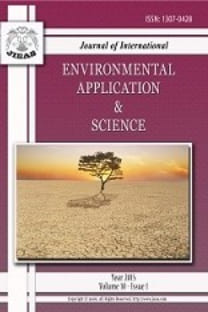Estimating Drought Index Using Standardized Precipitation Index from 1901 to 2015, Turkey
___
- Alston M, Kent J, (2004) Social impacts of drought: a report to NSW Agriculture. Centre for Rural Social Research. New South Wales (Australia): Charles Sturt University.
- Angelidis P, Maris F, Kotsovinos N, Hrissanthou V, (2012) Computation of drought index SPI with alternative distribution functions. Water resources management, 26(9), 2453-2473.
- Bandyopadhyay N, Bhuiyan C, Saha A, (2016) Heat waves, temperature extremes and their impacts on monsoon rainfall and meteorological drought in Gujarat, India. Natural Hazards, 82(1), 367-388.
- Berhanu FA, JM, K.-O. (2013). Regional drought severity assessment at a basin scale in the Limpopo drainage system. Journal of Water Resource and Protection, 2013.
- Bond NR, Lake P, Arthington, A. H. (2008). The impacts of drought on freshwater ecosystems: an Australian perspective. Hydrobiologia, 600(1), 3-16.
- Ceylan A. (2009). Drought management plan for Ankara, Turkey. WMO's Newsletter: MeteoWorld.
- DaMatta, F. M., & Ramalho, J. D. C. (2006). Impacts of drought and temperature stress on coffee physiology and production: a review. Brazilian Journal of Plant Physiology, 18(1), 55-81.
- Emre, D., Turkish Inflation blow to PM Erdogan’s Santa Evita Myth, 2014, http://www.economonitor.com/emredeliveli/2014/02/09/turkish-inflation-blow-to-pm-erdogans-santa-evita-myth/
- He B, Lü A, Wu J, Zhao L, Liu M, (2011) Drought hazard assessment and spatial characteristics analysis in China. Journal of Geographical Sciences, 21(2), 235-249.
- http://www.world-grain.com/articles/news_home/World_Grain_News/2016/02/Turkeys_ drought_condition_affe.aspx?ID=%7B23E27926-3BDD-4334-8049-862FD99A3033%7D.
- McKee TB, Doesken NJ, Kleist, J, (1993) The relationship of drought frequency and duration to time scales, Preprints, 8th Conference on Applied Climatology, Anaheim, CA, Amer. Meteor. Soc., 179–184.
- Loukas A, Vasiliades L, (2004) Probabilistic analysis of drought spatiotemporal characteristics inThessaly region, Greece. Natural Hazards and Earth System Science, 4(5/6), 719-731.
- Sivakumar, M. V., Stefanski, R., Bazza, M., Zelaya, S., Wilhite, D., & Magalhaes, A. R. (2014). High level meeting on national drought policy: summary and major outcomes. Weather and climate Extremes, 3, 126-132.
- Tsakiris G, Loukas A, Pangalou D, Vangelis H, Tigkas D, Rossi G, Cancelliere A, (2007) Drought characterization. Drought management guidelines technical annex, 85-102.
- Türkeş M, (2010). Klimatoloji ve meteoroloji: Kriter Yayınevi.
- Wilhite, D. A. (2000). Drought as a natural hazard: concepts and definitions.
- Wu H, Hayes MJ, Wilhite DA, Svoboda MD, (2005). The effect of the length of record on the standardized precipitation index calculation. Int. J. Climatology, 25, 505-520.
- Wu H, Svoboda MD, Hayes MJ, Wilhite DA, Wen F, (2007) Appropriate application of the standardized precipitation index in arid locations and dry seasons. International Journal of Climatology, 27(1), 65-79.
- Xu Y-P., Lin, S-J, Huang Y, Zhang Q-Q, Ran Q-H, (2011) Drought analysis using multi-scale standardized precipitation index in the Han River Basin, China. Journal of Zhejiang University-SCIENCE A, 12, 483-494.
- Yusof F, Hui-Mean F, Suhaila J, Yusop Z, Ching-Yee K, (2014) Rainfall characterisation by application of standardised precipitation index (SPI) in Peninsular Malaysia. Theoretical and applied climatology, 115(3-4), 503-516.
- Zhai J, Su, B, Krysanova V, Vetter T, Gao C, Jiang T, (2010) Spatial variation and trends in PDSI and SPI indices and their relation to streamflow in 10 large regions of China. J. Climate, 23, 649-663.
- ISSN: 1307-0428
- Yayın Aralığı: Yılda 4 Sayı
- Başlangıç: 2006
- Yayıncı: Selçuk Üniversitesi
Utilization of Fly Ash Raw Material as Brick Production: A Review
Nahida Hameed Hamza AL-QAYSİ, Sukru DURSUN, Mushtaq Abdulameer Alwan ALMUSLEHİ
Determination of Optımum Irrigation Network in Land Consolidation Projects
Green Infrastructure Systems and Their Importance in Our Life
Nilgün YENİL, Fadim YEMİS, Sukru DURSUN, Bahriye GULGUN
Eman Hussein ABED, Nadia İmad AL AMEEN, Liqaa Ali JAZAA
Estimating Drought Index Using Standardized Precipitation Index from 1901 to 2015, Turkey
Nahida Hameed Hamza AL-QAYSİ, Sukru DURSUN, Mushtaq Abdulameer Alwan ALMUSLEHİ
Assessment of Groundwater Quality in Village Pepaj, Rugova Region, Kosova
Nushe LAJÇİ, Blerim BARUTİ, Xhemë LAJÇİ, Mensur KELMENDİ
Nushe LAJÇİ, Blerim BARUTİ, Xhemë LAJÇİ, Mensur KELMENDİ
